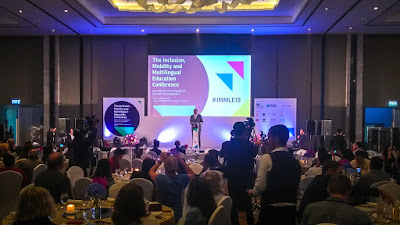[MLE] Conference on MLE, Mobility and Inclusion
 |
| Dr Michel Kenmogne gives a welcome speech at the reception on the first day of the conference. |
Last week I attended the “Inclusion, Mobility and Multilingual Education Conference” in Bangkok. This time the MLE conference was done together with the British Council’s recurring conference on Language and Education which resulted in a larger and richer conference with about 450 participants from a broad range of disciplines participating. The topic of “inclusion and mobility” provided a good opportunity to link MLE to the increasing number of issues around migration and identity. At least 30 participants were from India, several of who gave a presentation. For now, we will give a few impressions with links to abstracts. At a later stage, the full presentations will become available.
Some of the India-related presentations/abstracts as listed on the Conference program were:
- Debjani Sahu (Jawaharlal Nehru University), Indian Diaspora in South Africa and the Loss of Home Language (238A)
- Balsubramanium Anusha (The English and Foreign Languages University) Translanguaging Practices in Developing Primary Grade School Skills: Evidence from Challenging Indian Contexts (105C)
- Anjela Taneja (Oxfam India) The Right to Mother Tongue-Based Education in Tribal India: A Comparative Perspective (85C)
- Simhabaludu Boneti (World Vision India) Learning Changes from Not Knowing to Knowing (Key Factors that Promote or Hinder Lifelong Learning) (225A)
- Satya Bhushan (National Council of Educational Research and Training, New Delhi, India) and Varada Mohan (National Council of Educational Research and Training, New Delhi, India) English Language Learning Outcomes at the Secondary School Stage in India (237A)
- Hafeesha (University of Hyderabad) and Vishnu (University of Hyderabad) The Language Factor and Its Impact on the Alternative Education Project ‘Gothra Bandhu’: A Case Study from Thirunelly Village, India (256C)
- Mahendra Mishra (Odisha MLE Programme) (SPE6)
A particularly interesting session was on Early Literacy and Multilingual Education in South Asia. The research paper (see my last blog post) “Early Literacy and Multilingual Education in South Asia” was presented by Dhir Jingran. Some conclusions are that 40% of the children in South Asia study in a language unfamiliar to them. Aspiration for English is high. A typology was developed to address the issues related to these complications.
To me, the most future-looking presentations were on the use of multiple languages in the classroom. I attended the one on Translanguaging by Dr Sangsok Son and Minjung Kim. Their pilot project in Northern Thailand can provide helpful insights for classrooms in India. From my perspective, many more pilot projects need to be undertaken with the translanguaging phenomenon in mind. Could the next MLE conference in three years time be on something like: “Translanguaging and Multilingual Education”?
The conference included some closed sessions with government officials. They have been working on a conference statement. This is still in process but below is a preliminary draft of what they came up with. It is clear from the presentations and panel discussions that, unless governments get fully behind this, MLE will remain marginal, and a large amount of children will continue to be taught in a language they hardly understand. May the Bangkok Statement be well-received!
Regards,
Karsten
Draft Bangkok Statement
- Highlighting language(s) of instruction issues in the national education discourse
- Fostering investment for quality multilingual education
- Enhancing the quality of multilingual education
- Diversifying the teacher workforce
- Gathering data disaggregated by home or first language
- Strengthening partnerships with relevant stakeholders and partners
- Tracking the progress on SDG indicator 4.5.2